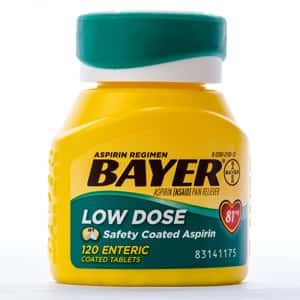
Millions of people take low-dose aspirin (once called “baby aspirin,” though it is not for babies) to protect themselves from blood clots that could lead to a heart attack or stroke. People at higher risk for heart problems or a stroke get the most benefit from aspirin, but they are also most vulnerable to excessive bleeding from the drug (Mora & Manson, JAMA Internal Medicine, Aug. 2016). As a result, they may face a difficult dilemma prior to a surgical procedure: should they stop taking aspirin or not?
Do You Need to Stop Taking Aspirin for a Biopsy?
Q. I need to have a prostate biopsy in a few weeks. I take low-dose aspirin daily on the recommendation of my internist. Will I need to stop the aspirin before the biopsy?
A. You should absolutely check with the urologist at least a week before your biopsy. One study suggested that men need not stop low-dose aspirin prior to biopsy (Vasudeva et al, International Brazilian Journal of Urology, Nov-Dec. 2015).
What Happens If You Stop Taking Aspirin?
Your question is difficult, because research has shown that people who stop taking aspirin for reasons other than for surgery are more likely to suffer a heart attack. Another reader wrote to us about this hazard.
Q. I read your column about a woman who stopped aspirin and had a heart attack. Almost thirty years ago I started taking aspirin.
In December, 2015, I was getting ready to have shoulder replacement surgery. There were a lot of scans and tests to be sure everything looked good before the surgery. They ALL checked out fine. A week before the surgery, I had to stop taking my aspirin, omega-3 fish oil and OTC supplements.
Two days before the surgery, I woke up fuzzy. As it turned out, I’d had a blood clot go to my brain and cause a mild stroke. After three months of heart monitoring and tests, the neurology doctors said it was rare, but they think going off aspirin caused the blood to clot and stop up a small artery.
Serious Consequences for People Who Stop Taking Aspirin:
A. Swedish researchers reported that patients who stop low-dose aspirin appear to be more likely to suffer a heart attack or stroke (Sundstrom et al, Circulation, online, Sept. 25, 2017). They hypothesized that this may be a rebound blood-clotting effect.
This new information poses a dilemma for surgeons. They often advise patients to stop taking aspirin prior to surgery to prevent excessive bleeding. This new information may call for a re-evaluation of the protocol. Unfortunately, we do not have any studies to show us the safest way to stop taking aspirin.
The situation may not be entirely grim. A review of all available well-controlled studies of patients having non-cardiac surgery found that stopping aspirin made little or no difference in serious bleeding (Lewis et al, Cochrane Database of Systematic Reviews, July 18, 2018). That said, patients undergoing surgical procedures should always check with the surgeon at least a week or two beforehand.

